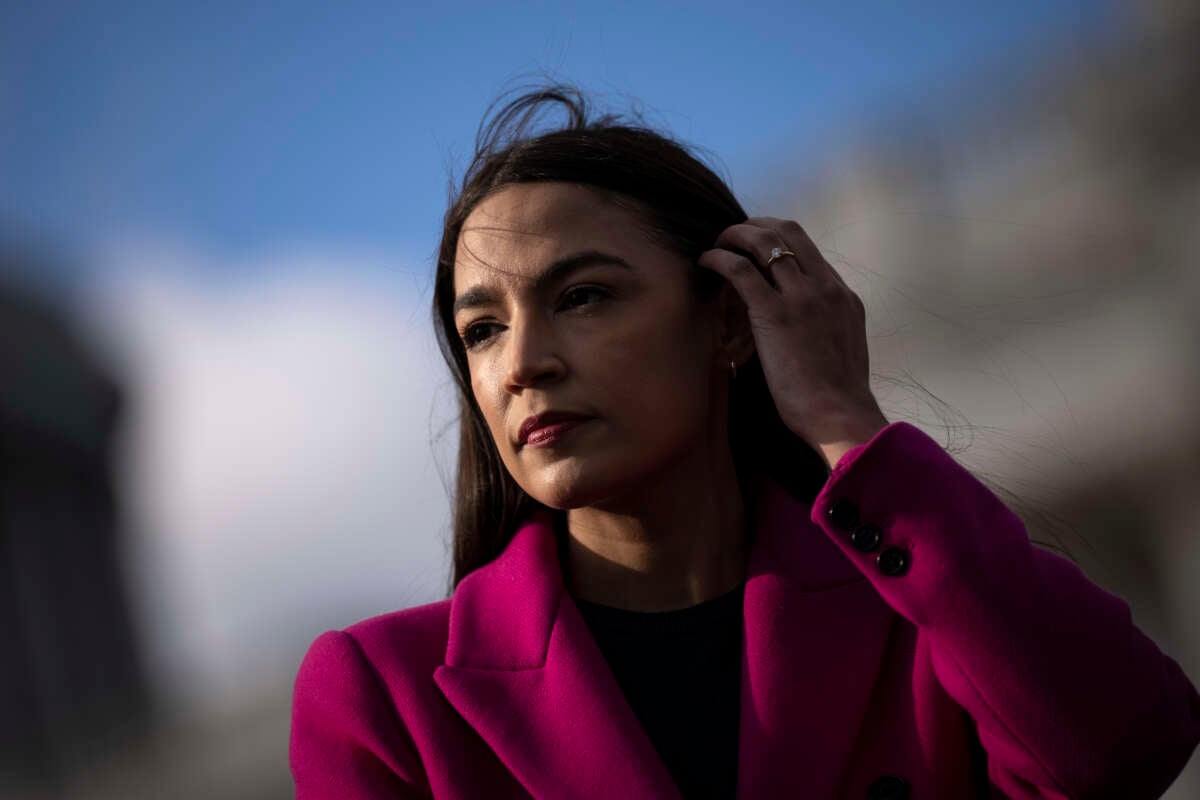Honest, paywall-free news is rare. Please support our boldly independent journalism with a donation of any size.
In a new interview, Rep. Alexandria Ocasio-Cortez (D-New York) has spoken out about the myriad societal causes behind the tragic death of Jordan Neely on a New York City subway last week, saying that his death was the direct result of policy decisions that left him vulnerable to people with a violent hatred of poor people.
Speaking with The Cut this week, Ocasio-Cortez said that the neoliberal policies put in place by New York City Mayor Eric Adams (D) are creating truly unsafe conditions for residents of the city — but not in the ways that the right-wingers defending Neely’s killer, Daniel Penny, may think.
The right has been callously claiming that Neely — who was reportedly shouting about his need for food and stability before he was choked to death by Penny last Monday — essentially deserved to die in order for other people on the subway car to feel safe. But, as Ocasio-Cortez pointed out, almost every working class person in the U.S. is “closer to Neely than we are to a billionaire,” due in large part to extremely economically precarious conditions for the working class.
“Jordan Neely was saying exactly what he needed, which was food. He narrated this tragedy himself. He said, ‘I’d rather be in jail than try to navigate what the city has become,’” she said. “Every single one of us is at the brink right now. Rents have skyrocketed to these absolutely extortionate prices. When housing prices go up, homelessness goes up. It’s not a grand mystery.”
Indeed, some of Neely’s last words, according to a witness, were about being fed up with his lack of food and shelter. “I don’t care if I die. I don’t care if I go to jail. I don’t have any food … I’m done,” Neely said, according to witness Juan Alberto Vazquez. His words were what seemed to have triggered Penny to place Neely in a chokehold that lasted 15 minutes, according to Vazquez.
Adams’s moves to strip the city’s homeless services bare and worsen conditions for people experiencing homelessness, reduce access to mental health and other public services, and increase criminalization by funneling money to the New York City Police Department have all created conditions for people like Neely to suffer, Ocasio-Cortez said. Meanwhile, fear mongering around crime by people like Adams has exacerbated the extremely negative public perception of poor people.
This is evident in part by Adams’s and other local Democratic leaders’ response to Neely’s killing. In the mayor’s statement last week, he appeared to blame Neely for his death. Adams said that “there were serious mental health issues in play” that could potentially create “dangerous situations” for people in the subway — despite the fact that there is no evidence that Neely was posing danger to anyone and that Vazquez has said that Neely wasn’t acting aggressively toward anyone in the subway car.
If the Adams administration were truly concerned about increasing public safety, Ocasio-Cortez emphasized, it would use “evidence-based policy” to help the people that it clearly and inhumanely views as a threat, rather than pushing them further into precarity.
“Jordan Neely was killed by public policy. He was killed by the demonizing of the poor by many of our leaders. He was killed by the same reluctance for people to see him as human that leaders are exhibiting right now, even in his death,” she said. “A safer city is one with fewer homeless people, not because they’ve been displaced but because they have been housed.”
Statements from people like Adams that appear to justify the violence that Penny unleashed will only lead to more violence, Ocasio-Cortez warned — perhaps similarly to the violence that activists protesting Neely’s death are currently facing by police.
“There’s a hypocrisy to the way many officials talk about public safety. All of these responses are acting as though Neely was the aggressor here, when he was the one who was murdered,” she said. “When you create a situation where harming a certain class of people may be excused, then we incentivize this kind of behavior. Anybody can point to anybody else and say, ‘Oh, well, I was scared of them.’”
“All of this has to do with race and class,” she said. “If the city just wants this to be a playground for the rich, that is the most dangerous outcome for all of us.”
Holding Trump accountable for his illegal war on Iran
The devastating American and Israeli attacks have killed hundreds of Iranians, and the death toll continues to rise.
As independent media, what we do next matters a lot. It’s up to us to report the truth, demand accountability, and reckon with the consequences of U.S. militarism at this cataclysmic historical moment.
Trump may be an authoritarian, but he is not entirely invulnerable, nor are the elected officials who have given him pass after pass. We cannot let him believe for a second longer that he can get away with something this wildly illegal or recklessly dangerous without accountability.
We ask for your support as we carry out our media resistance to unchecked militarism. Please make a tax-deductible one-time or monthly donation to Truthout.
